As India prepares for the next general elections, a lot of discussions revolve around the participation of first-time voters in what is referred to as the ‘festival of democracy’. The Election Commission of India (ECI) is actively promoting voter registration, with the introduction of four registration windows in a year. Several States have already signaled an increased number of first-time voters compared to the 2019 Lok Sabha elections, reflecting a growing engagement of the youth in the democratic process.
Recognising the crucial role these voters play, political parties are actively making efforts to connect with first time voters. On National Voters’ Day, observed on January 25th, Prime Minister Narendra Modi, during the ‘Nav Matdata Sammelan,’ urged first-time voters to ensure their registration in the voters list. He also asked them to suggest inputs for the party’s 2024 manifesto. Similarly, during his Bharat Jodo Yatra, Rahul Gandhi engaged in exclusive interviews with YouTubers as a move to reach out to the youth. With the 2024 elections just around the corner, political parties are strategically reaching out to millions of first-time voters, recognising the importance of their support and participation.
A recent study by Lokniti-CSDS interviewed 1,290 first-time voters (47% young men and 53% young women) in Delhi, hoping to understand their perspectives on politics, their voting intentions, and their opinions on key pressing issues.
Apathy or Enthusiasm
When it comes to the level of interest in politics among first-time voters, we asked them whether young individuals like themselves should be concerned about the country’s affairs, or if it’s a matter primarily for the older generations. Nine of every ten (91%) first-time voters expressed the view that they should indeed stay informed about these matters. Six per cent indicated a strong inclination to follow but admitted difficulty in understanding, while a mere 2% believed that such concerns were better left to the seniors.
When directly asked about their level of interest in politics, one-third (36%) of the first-time voters expressed a substantial interest, while four of every ten (43%) indicated a moderate level of interest. Only two in ten first-time voters conveyed either minimal interest or no interest at all in politics. This indicated a visible inclination towards political engagement among this demographic (Table 1). When it comes to engaging in political discussions, over six of every ten (60%) of the youngsters expressed that they actively participate in conversations about politics with friends and family. This indicated a substantive level of engagement about politics among the youth, demonstrating their heightened interest and connection to political developments. However, do young people’s interest in politics translate into action, such as registering to vote and voting in the upcoming Lok Sabha elections?

More than half (51%) of first-time voters in Delhi are yet to register themselves. Upon closer examination, a notable trend surfaces. Among the 18-year-olds, a striking three-quarters are yet to register (Table 2). The trend persists as we look at those aged 19 years, with over half (56%) failing to register. However, there’s a gradual decrease in this proportion of those non – registered for subsequent age groups.

While half the unregistered individuals (51%) plan to register for the upcoming elections, the rest cite various reasons for not doing so. Among these, two of every ten (19%) cite the lack of time and one of every ten (11%) were unsure of whether their registration had been accepted. One-sixth (16%) gave a range of other reasons — facing registration obstacles due to a lack of required documents, lack of interest in voting, lack of knowledge about the registration process, and applications were rejected (Table 3).
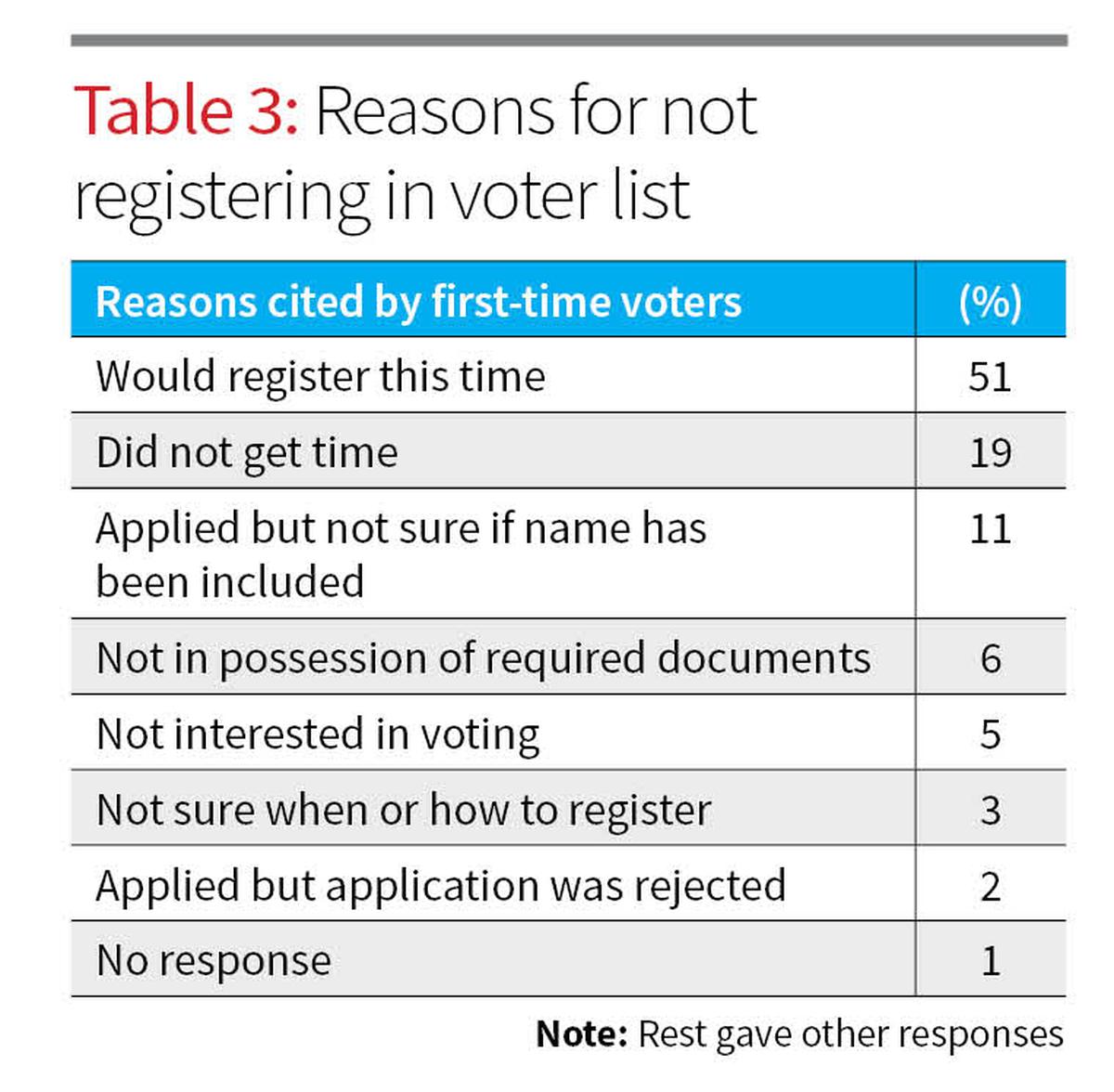
When questioned about their inclination to participate in the 2024 Lok Sabha elections, nearly seven in 10 voters expressed a high likelihood of voting, stating they are either very likely or somewhat likely to do so. Conversely, about one in 10 voters indicated a lower likelihood or complete unwillingness to vote. Additionally, two in 10 respondents mentioned that they would vote if they managed to register themselves by the time of the elections.
Narendra Modi’s appeal
PM Narendra Modi appears to have considerable support among first-time voters. When a question tapped their sentiments towards Mr. Modi, nearly half of the first-time voters (48%) expressed a strong liking for him, with one-third indicating a moderate level of liking (33%). A little over one in ten had limited liking, and 8% expressed a strong negative rating (Table 4).
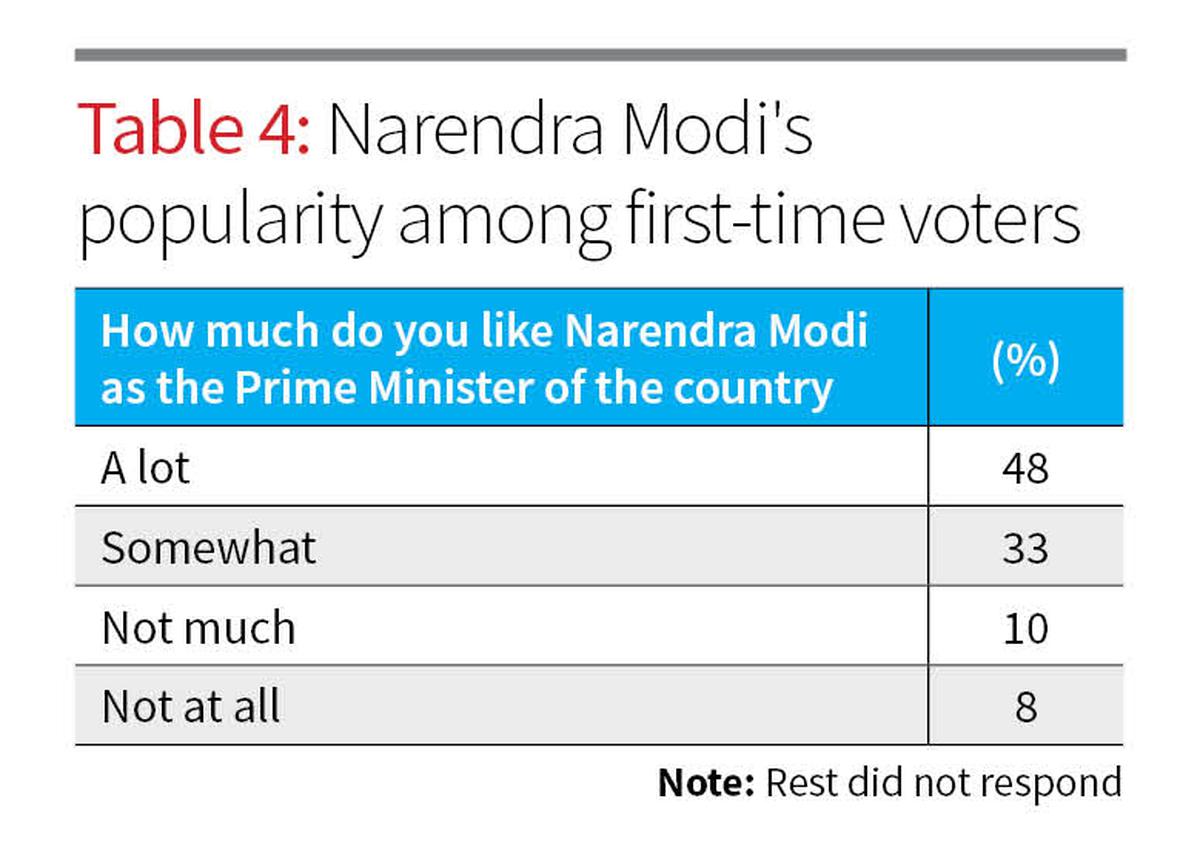
Digging deeper into the reasons behind their liking, his oratory skills and India’s international image under his leadership stood out — mentioned by two in every 10 youths. For close to two of every 10 (17%), it was his charisma, and one in every 10 (11%) identified his decisiveness as the most likable trait. Additionally, close to one in every 10 (8%) youth appreciated his hard work, while another one in every 10 (7%) highlighted his policies (Table 5). Beyond mere liking, a significant four in 10 young voters believe that no one from the Opposition parties can pose a challenge to Mr. Modi in the upcoming Lok Sabha elections (Table 6). Roughly an equal proportion mentioned Mr. Rahul Gandhi and Arvind Kejriwal (17% and 16%, respectively). All other leaders received minimal mentions. Fifteen percent found it difficult to give a name. This sentiment not only strengthens Mr. Modi’s political standing but also highlights the formidable task facing Opposition parties in presenting convincing alternatives capable of resonating with a significant portion of first-time voters.
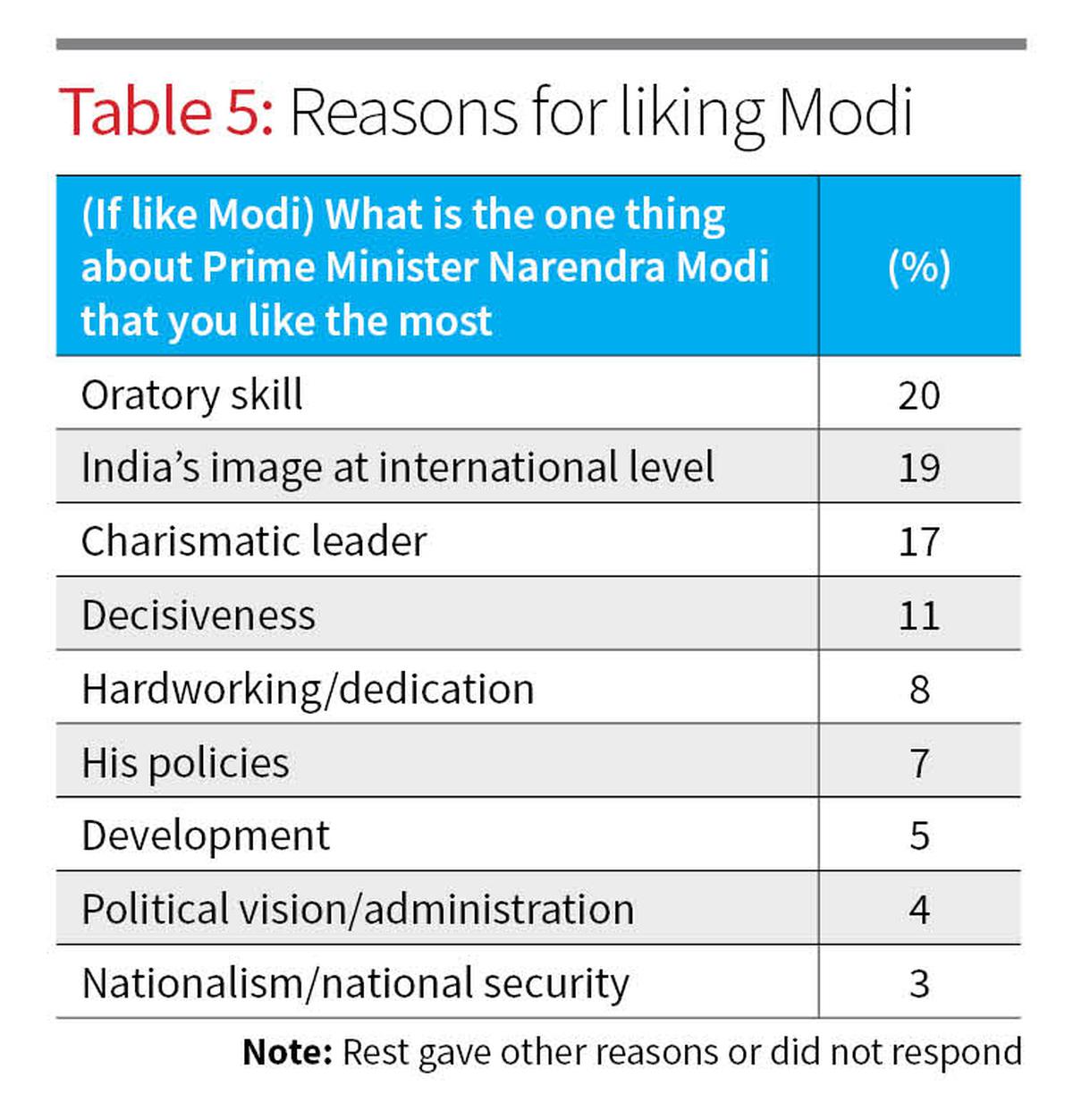
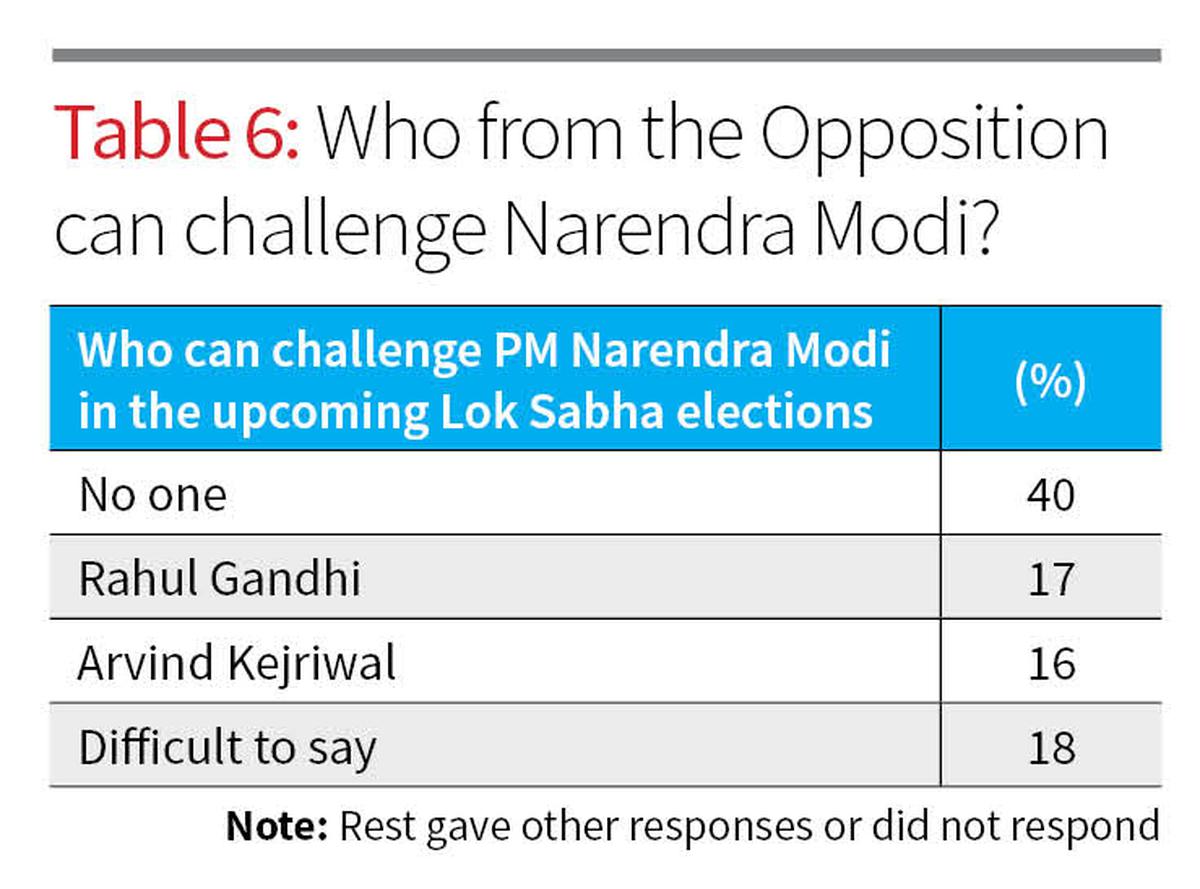
On governing States and the nation
Data suggests that there is a significant preference for the Bharatiya Janata Party (BJP) among first-time voters when it comes to running the government at the national level. The BJP has a substantial lead with 70% support, indicating a widespread belief among first-time voters that the BJP is best suited for national governance. The Congress and the Aam Aadmi Party (AAP) lag significantly behind in this context. However, when it comes to governance at the State level, particularly in Delhi, the dynamics shift. AAP secured the preference of 49% of the youth, closely followed by the BJP at 33%. Meanwhile, the Congress garnered a minimal mention, with only 3% of young voters expressing support for the party.
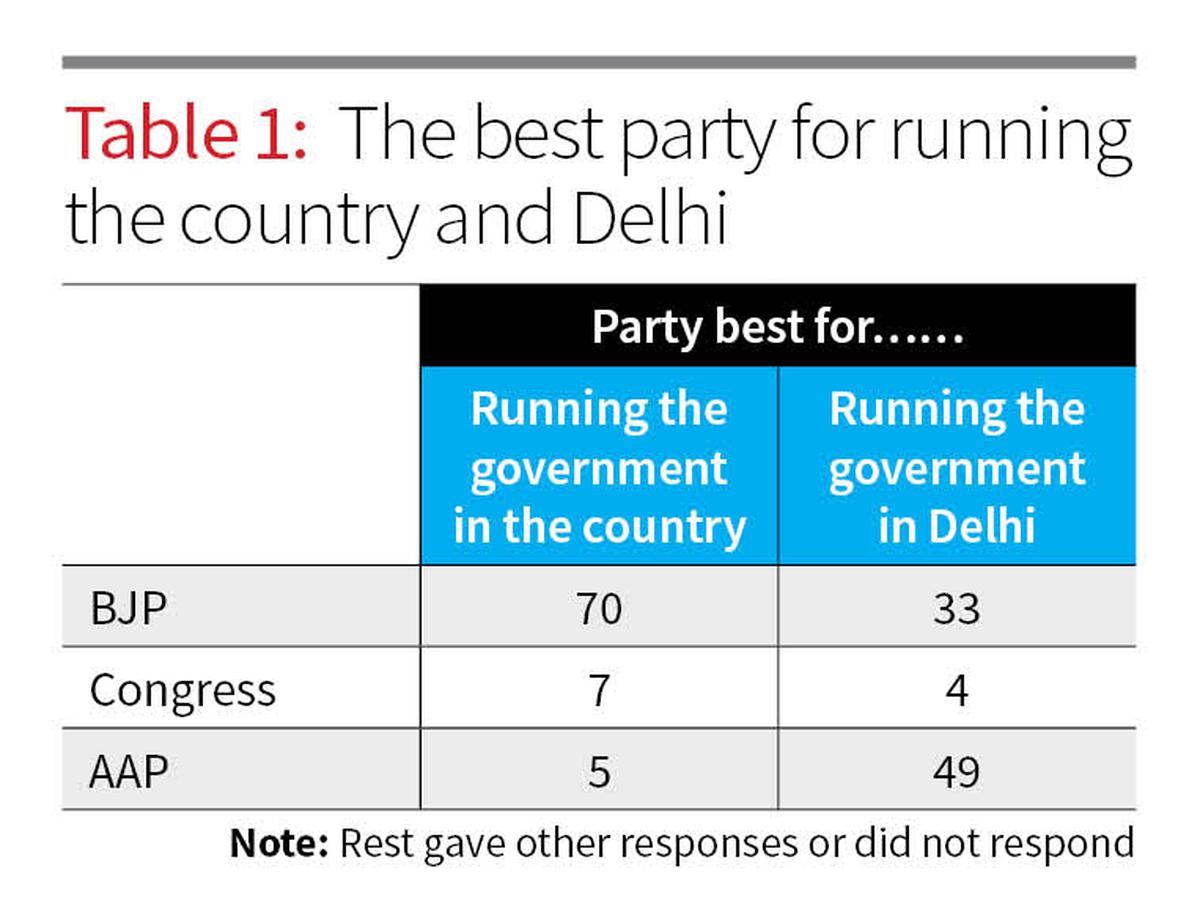
Upon examining specific issues relevant to the youth, it becomes evident that the Bharatiya Janata Party (BJP) stands out as the preferred choice for addressing youth-related challenges and creating employment opportunities. In contrast, other political parties have limited support in this regard. Interestingly, a notable three in ten voters expressed that no party adequately prioritises these critical issues. However, when it comes to providing quality education, a distinct competition emerges between the AAP and the BJP. An almost equal number of young voters perceive both parties as strong contenders in this crucial area.
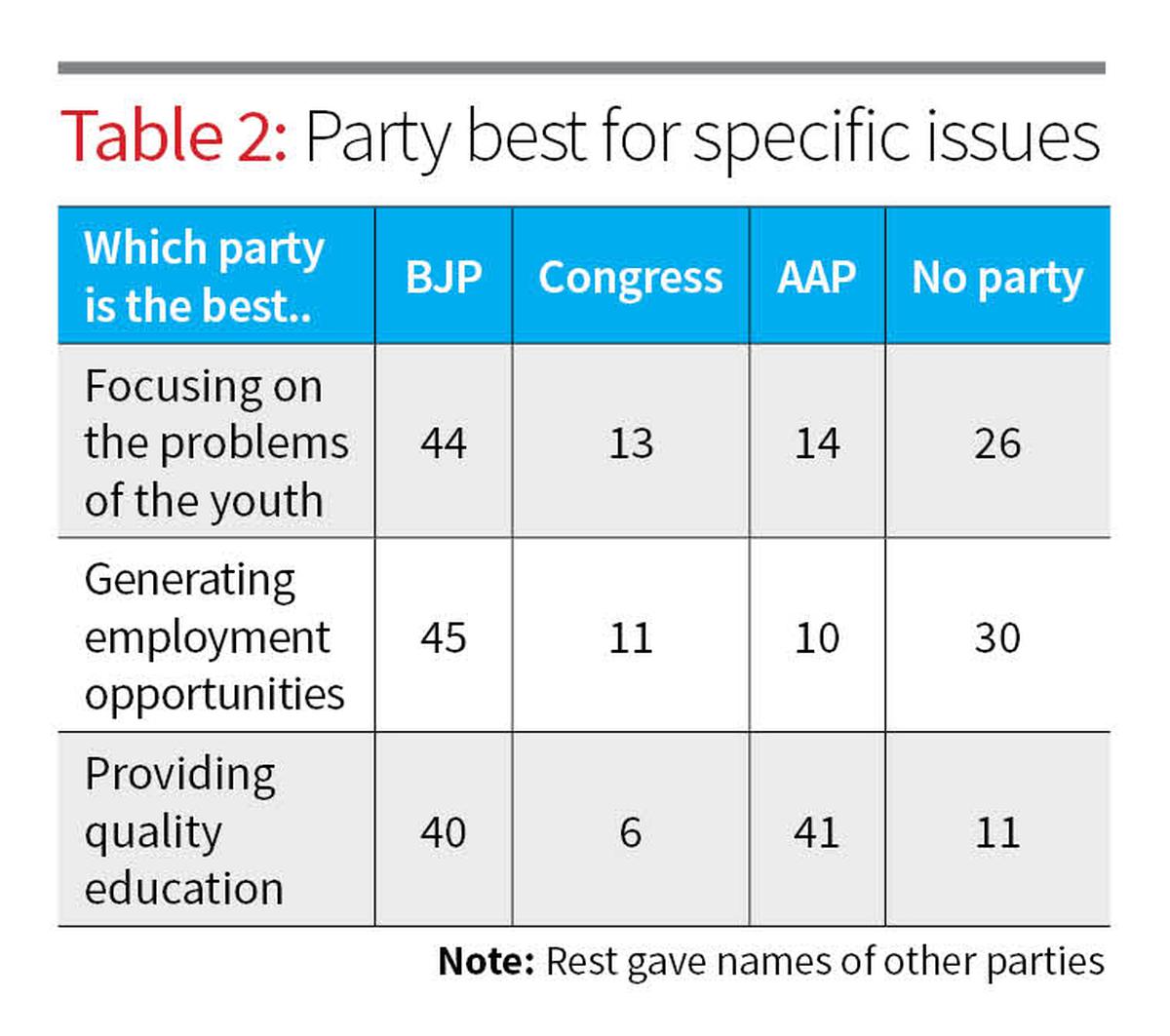
On gauging young respondents’ opinion on the Narendra Modi government we asked them what work done by the Modi government did they like the most. Development emerged as the most appreciated aspect, garnering 20% approval, followed by 11% acknowledging the government’s efforts in protecting religious interests. Other mentions include 6% approval for maintaining law and order, 5% for initiatives to enhance women’s security, and 4% each for reducing unemployment, improving education, and aiding the underprivileged.
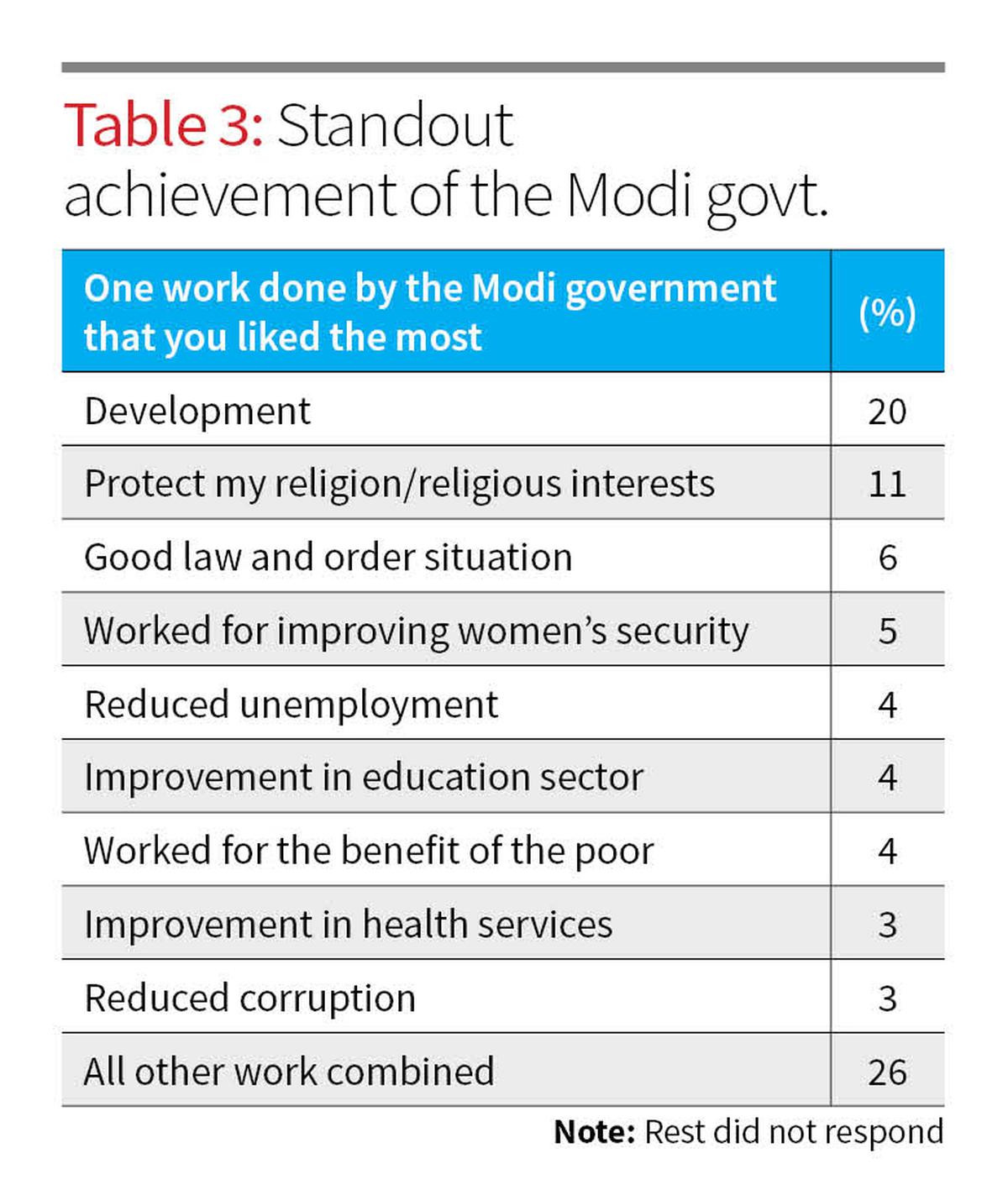
On the contrary the most disliked work of the Modi government reveal diverse concerns. For 17% of first time voters it was an the perceived increase in communalism. Following closely, 15% expressed discontent with the issue of price rise, while 12% were critical of the government’s handling of increasing unemployment. A 3% disapproval rate is observed for multiple aspects, including a perceived rise in corruption, the belief that the government did not work for the benefit of the poor, concerns about the education sector, and the reported increase in crimes against women.
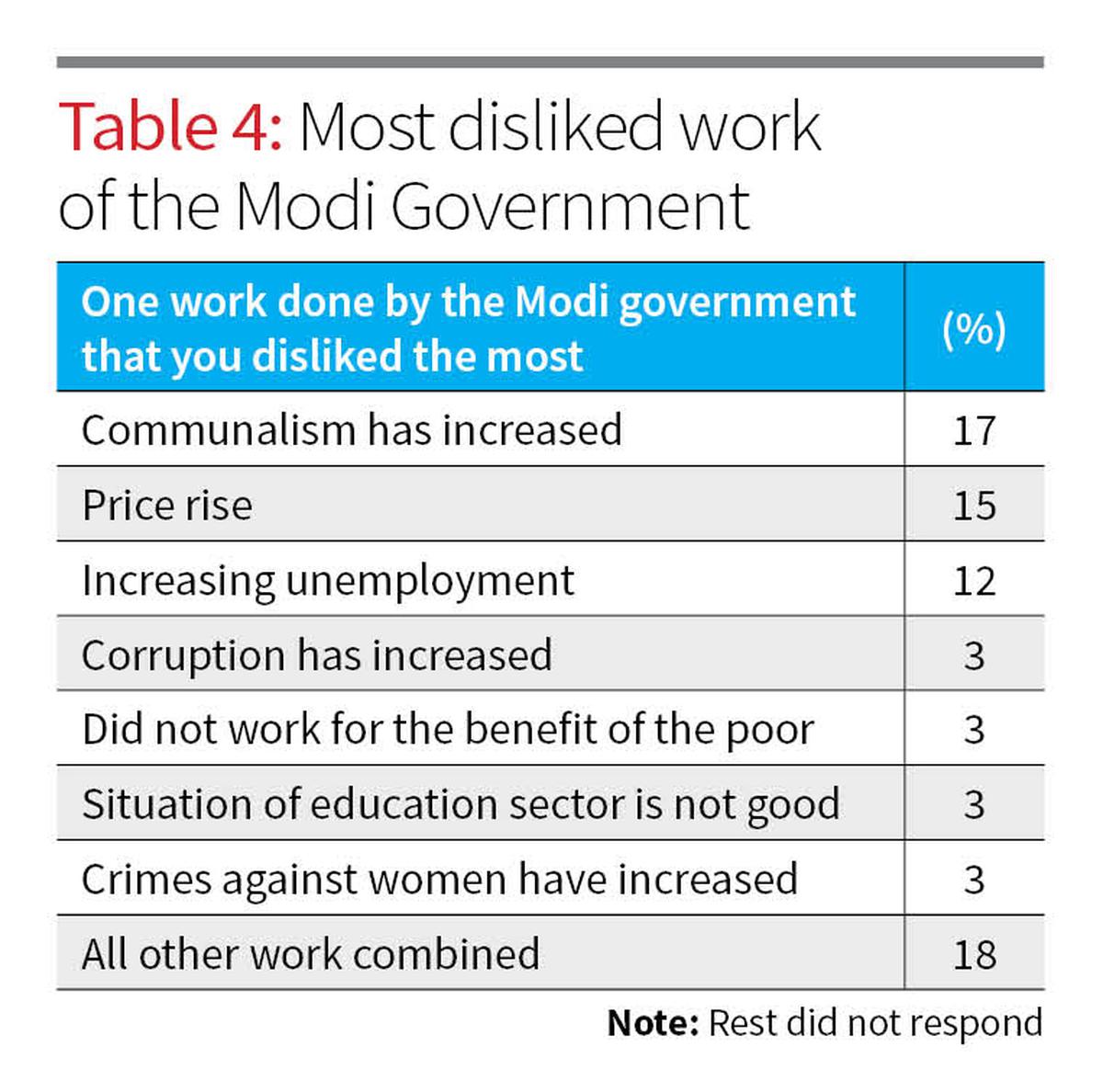
On the temple inauguration
In exploring the perspectives of first-time voters on critical issues, we inquired about their opinions on the caste Census and their stance on the inauguration of the Ram Mandir.
With respect to the caste Census, the data indicates an equal divide in the opinion regarding the need for conducting a caste Census in India. While 48% favoured the idea of conducting a caste Census, 46% believed it to be unnecessary.
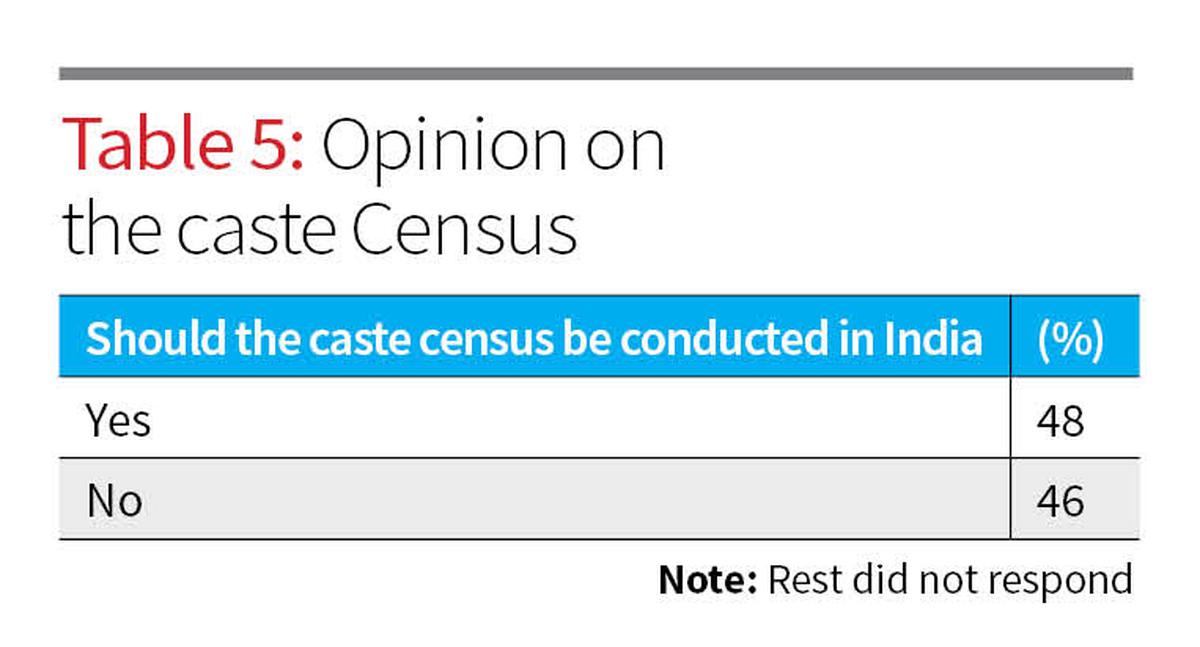
With the recent inauguration of the Ram Mandir at Ayodhya, we asked first-time voters how how proud they felt about the construction of the new temple. More than two thirds (67%) expressed a deep sense of pride and another one sixth (15%) indicated being somewhat proud, suggesting an considerable overall positive mood. However, there was a notable one sixth — 8% who reported not feeling much pride, and an additional 8% expressing no pride not feeling proud at all regarding the construction of the temple.
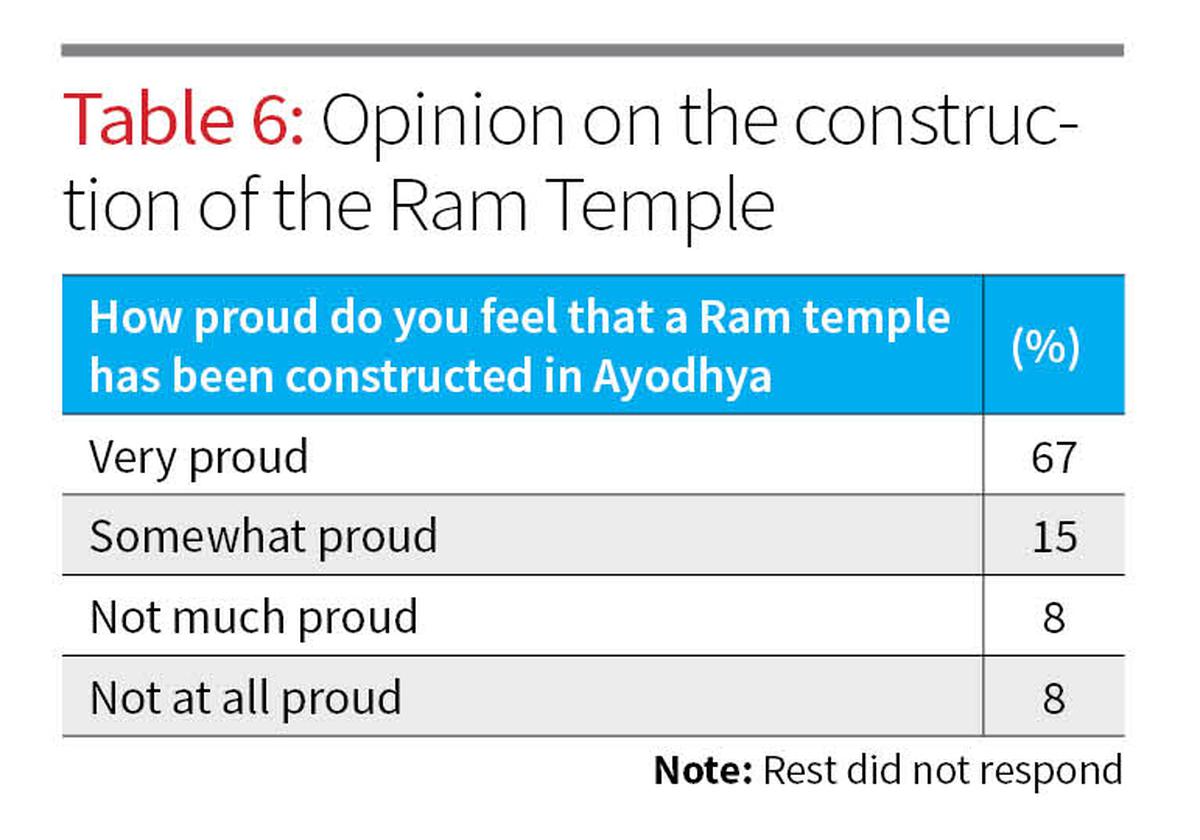
A further question was posed regarding the significance of the grand celebration, questioning whether it was truly essential or if its inauguration was strategically aligned with the upcoming 2024 Lok Sabha elections to secure a favourable vote bank. On this matter, the younger generation expressed divergent opinions, with a nearly equal split between those viewing it essential and those asserting its connection to political motives.
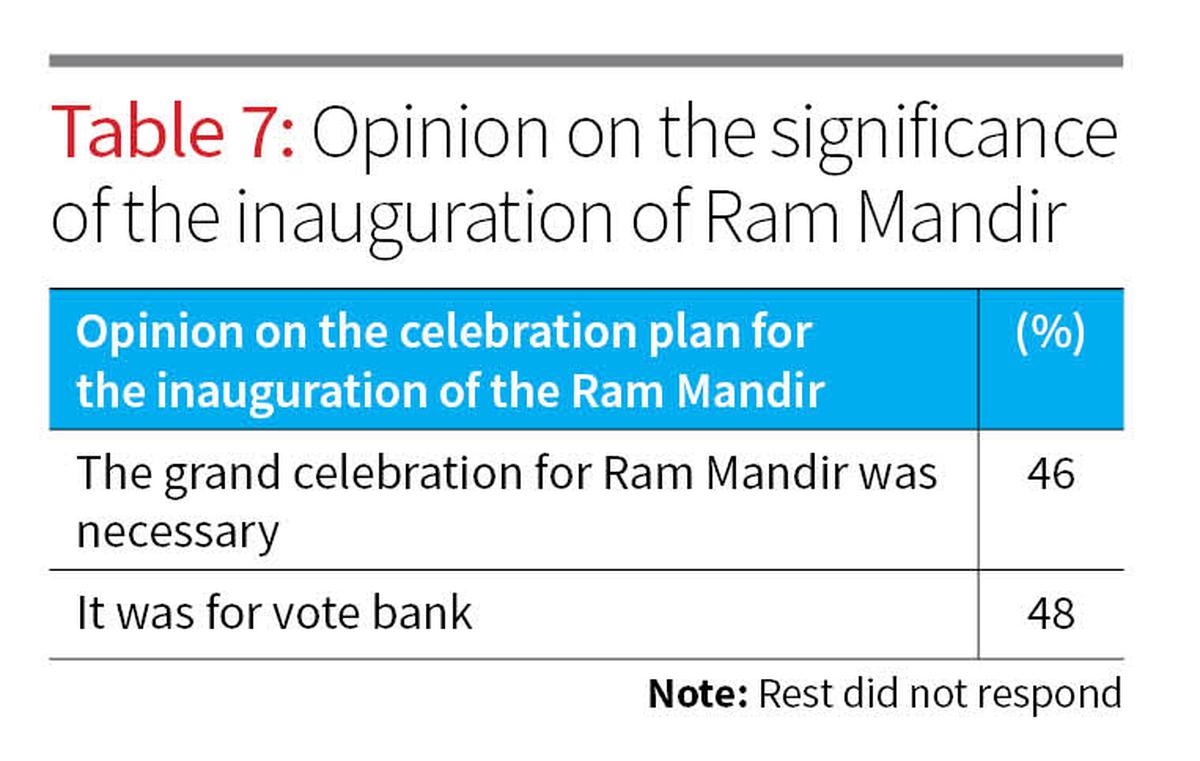
Upon examining the vote preferences of the young who are planning to vote in the upcoming Lok Sabha elections, two thirds (67%) expressed their intent to vote for the BJP. The Congress party garnered the preference of 8%, while AAP secured the support of 7%. The collective mention of all other parties amounted to 4%. Notably, 16% of respondents chose not to disclose their voting intentions.
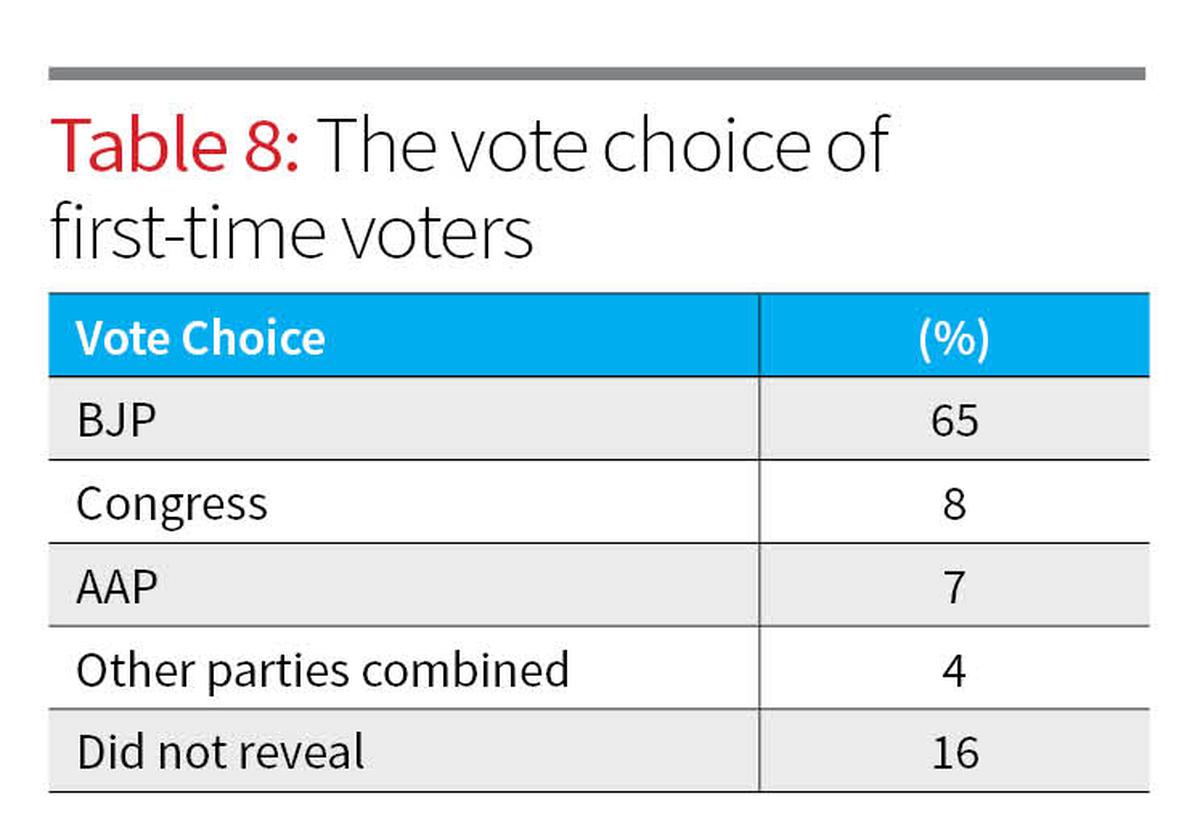
The findings of the study emphasise the continuously growing popularity of Mr. Modi, a discernible factor that significantly shapes the voters’ preference in favour of the BJP.
A study by the Lokniti-CSDS research team which includes Vibha Attri, Sanjay Kumar, Suhas Palshikar, Sandeep Shastri, Jyoti Mishra and Abhinav Pankaj Borbora.





